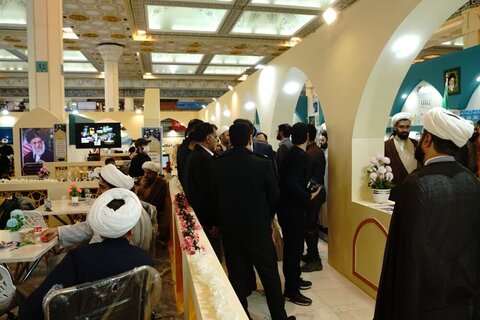Hawzah News Agency- Meeting "The Place of the Holy Quran in Contemporary Africa" was held last night with the presence of Quranic elites from Tunisia and Algeria at the international venue of the exhibition.
Referring to the presence of Quran reciters in the court of King Najashi of Abyssinia (modern day Ethiopia) following the advent of Islam, Seyyed Hassan Esmati, the secretary of this meeting, considered Africa to be the first destination of Quranic diplomacy in the history of Islam.
In another part of this meeting, the Tunisian Quranic calligrapher Omar bin Ali al-Jumani Referred to the history of Islam in Tunisia and said,” Quranic arts in Tunisia have their roots in the history of this country and Andalusia, and Zaitouneh Mosque in Tunisia played a central role in the Quranic activities of this country. People like Ibn Ashur were both commentators and calligraphers.”
This famous calligrapher of the Islamic world further pointed out the position of Mushaf in Tunisia and said,” Many Mushafs have been calligraphed in Tunisia, such as Mushaf Tijani Mohammadi and Mushaf al-Maratiyah, and I myself have written a Quran that will be published soon.”
In addition, Ermouli Bilal, a professor at the University of Algeria and a Quranic activist, also briefly mentioned the history of Islam in Algeria and the great love of the people of this country for the Quran, which is manifested in books; presently, tens of thousands of them are active in Algeria. He further stated that the term Farsan al-Quran (Knights of Quran) in Algeria, which has been used since the past, is for those who memorize Holy Quran.

